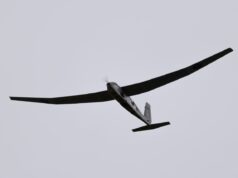In a letter to Tanmanjeet Dhesi MP, Chair of the Defence Committee, Defence Minister Luke Pollard has set out how the Ministry of Defence and industry are working to sustain critical skills for the Global Combat Air Programme (GCAP) as Typhoon production at Warton faces the prospect of winding down without new orders.
Pollard stressed that “ensuring GCAP is enabled by the skills and technologies required has been a priority for the Department and our industry partners since the programme’s inception.” He highlighted the role of the Future Combat Air System (FCAS) Technology Initiative, a joint MOD-industry R&D programme, which has allowed companies to expand their workforce at the pace required and develop the necessary expertise.
The letter underlined a broad approach to workforce planning, including attracting talent from outside the combat air sector, engaging with academia and wider STEM initiatives, and promoting careers in GCAP to secure the future pipeline. Pollard emphasised not only recruitment but also retention, stating that MOD and its core partners are “working hard to ensure we retain a positive and inclusive culture.” Hundreds of organisations across the supply chain, from universities to SMEs, are now engaged in the effort.
While GCAP will build on the Typhoon skills base, Pollard confirmed that the MOD continues to invest in Typhoon to sustain the RAF’s capability and to pursue export opportunities. He pointed to ongoing campaigns, most notably the Memorandum of Understanding signed in Istanbul between the Defence Secretary and Turkish Defence Minister Yaşar Güler as a “major step towards the export of Typhoon fighter jets to Türkiye.” Such a deal, Pollard said, could support the 20,000 UK jobs tied to the Typhoon programme.
Export campaigns are also being pursued by Eurofighter partner nations Germany, Spain and Italy, while new domestic orders within those countries will see UK industry play a key role, given that 37% of all Typhoons are manufactured in Britain. Pollard noted that these orders underline confidence in Typhoon as “the backbone of their combat air fleets for decades as the UK, Italy and Japan continue to develop GCAP.”
Should any gap in production lines emerge, Pollard explained that BAE Systems has contingency plans to redeploy staff across the wider Typhoon programme and other complex combat air projects, mitigating the risk of losing skilled workers.














So glad they are focused on an inclusive culture.
You took the bait and swallowed the whole hook.
But … are they focused on a “woke” inclusive culture in the way your sarcasm implied? or are they interested in promoting a harmonious workplace that generates a trouble-free, well ordered system of continuous operations, one that pursues a steady, rhythmic beat and is frictionless … A fundamental principal of manufacturing. Do you want segregation and friction leading to the proverbial spanner in the works and envitable delays?
Maybe, this it just a government Minister projecting the customary, yet principled aspects of the UK to an international community? nothing more than customary bolted on boilerplate text.
I can see how easy it is to pick on minorities if you are a part of the cultural elite, no thought or quarter given to those you consider beneath you. An inclusive culture is a SIMPLE idea. create an environment where all individuals feel respected, valued, and empowered to contribute their unique perspectives, regardless of their background and impart their worth, skills and potential to a company and the country as a whole. Simply having a diverse group of people in a supportive community where everyone has a sense of belonging and can fully participate, equitable opportunities, respectful behavior fosters belonging and innovation. Yes, lots of big words and big ideas, but in essence it is very simple.
Unquestionably, there is a minuscule minority within the minorities who reject the idea of democracy and want to deconstruct UK as we know and love, they want to reimagine it in their own grotesque beliefs, those people should be / need to be prosecuted to the absolute maximum; no quarter given.
—
Buying more Typhoons seems logical from a numbers only perspective, but would they be delivered in a timely fashion.
They clearly weren’t on a fishing expedition, so there was no ‘bait.’
You’re response needs to be deconstructed with a detailed response. Unfortunately, I don’t have time to give it.
It is called order some typhoons and upgrade all the rest. It is not as if we don’t badly needed them.
Wake me up when the defence investment plan is published.
Do we know when it’s actually due out?
Autumn 2025….🤔
Or delayed to 2030 like everything else…
The budget is scheduled for November so expect the defence investment plan on the 31st October…just scraping into autumn.
well I’m seeing brown leaves and cold weather..
Sounds terrible. Have you thought about taking a nice warm cruise in the Arabian Gulf? I believe there’s an OPV headed that way. Tell them George sent you.
I like the autumn thanks and cannot stand Africa to hot.
Paul…and we are also still waiting for the Defence Command Paper/White Paper following the SDR, which itself took an incredibly lengthy time to deliver.
This Government is over a quarter the way through the Parliamentay Term…and I don’t think they have ordered a single new platform for any of the Services. (Very happy to be corrected!)
Maybe the additional MLRS, though I don’t know when these were ordered. Whatever is happening is proceeding so slowly it looks like nothing is happening. Lots of opportunity for speculation on equipment. An ARES based IVF and Patria look good bets for the army and I reckon the navy will get a few Kongsberg Vanguard OPV / MCM . Seems to me the real issues are army numbers and SPA; my gut feel is that not everyone feels that the Boxer RCH155mm is a shoe in choice – timing, development, cost?
We need a fleet of armed light aircraft such as tucano as counter drone squadron…. In my mind the we count as cheep defense…..
I would say that ‘if’ we are still hoping for a 2035 entry into service of GCAP, then surely the Thypoon assembly facilities will need to be wholesale stripped out and converted for the new 3D printing magic source machines anyway?
Pour in a pint of GCAP solution into the funnel and airframe assemblies come out the other end…
Replace the Tranche 1 and 2 with new build.
Lets face it, they will be worn out by the time GCAP replaces them.
You can see that, I can see that, but there are no signs ministers have. Useless, the lot of them.
Tranche 1 will be gone in the next 2 years….
Tranche 2 will be less than 30 years old when they get replaced…
Thats not worn out…
Tranche 1 have already gone except the 4 in the Falklands. They will be around until 2027.
Not theTranche 2! They have multiple- role capability, and still have plenty of life left in them. Upgrade them!
Sell them on.
Agree the RAF desperately do need new jets. Typhoon tranche 4 x24 is sorely needed to replace the tranche 1s already taken out of service.
I’d say also the government should urgently pursue the purchase of all 24 of Spain’s tranche 2 aircraft now being put up for sale. They can cheaply be bought and will be able to deploy all British advanced munitions like Meteor, storm shadow and Brimstone.
The RAF needs to stop it’s greediness for gold plated Gucci kit. We don’t need F35s to beat Russia’s Migs and Sukhois just need enough fast jets for a high intensity conflict and some attritional reserve. Use the typhoons as bomb trucks to deploy precision guided weapons outside SAM range and the F35s can see if they can go in and break up air defence networks with their stealth.
A small future purchase of more F35As, maybe 24 more after 2030 and then the RAF should switch entirely over to Tempest.
People, in the name of Lord Lucifer, stop confusing Tranches with capability. Tranches are a convent way of marking a batch in business terms, nothing more. Blocks (yes we adopted the US system) dictate what can and cannot be done.
So, we will do everything we can to maintain skills…..except provide continuity of work. Souhd familiar?
Well, we are upgrading 40 Typhoons with the new aeuropean common AESA radar which will keep a lot of BAE staff busy.for the next four or five years. It involves the replacement of most of the electronic system, additional power etc and the last figure I saw was £40+.million per plane, which sounds enormous.
A further buy of 24 new tranche 4 Typhoons would be brilliant, but I can’t see the budget being available. The fast jet budget is all earmarked for the remaining 35 F-35s on order and then no doubt needed to fund Tempest. Even if a few extra aircraft could be funded in the early ’30s, I think the RAF would go for more F-35a rather than Typhoon, basically a 5th generation stealth aircraft that comes in about 20% cheaper than a Typhoon.
That’s all true, but I am concerned that the scenario you put forward means in practical terms that the UK would be betting the farm on Tempest as it will then be the only aircraft this country builds right the way through parts production to final assembly.
It’s only a MOU with Turkey about a Typhoon purchase.
Trump has indicated he’ll let Turkey back into the F35 programme if they stop buying Russian oil. If that happens then the Typhoon purchase will probably be cancelled.
Tempest is too far off. We need more fully equipped Typhoons now, and retain design and production capability/supply chain. If UK Gov are serious about defence action is needed now. My test is an order for 40+ Typhoons for starters.
Or they could “DRUM” roll..order 30 new typhoons which would in one sweep secure the skills and production line without any possible risk of disruption and the creation of inefficient job and skills creation programmes that serve only that purpose.. and it would ensure the RAF could keep 6 front line typhoon squadrons as well as mitigate the risk of a late tempest programme and show increased deterrent by active use of the 3 Cs of deterrence..
Some it’s not just a 2 for 1 offer it’s a 1 for 4 offer..but that would involve actually signing a contract to build typhoons and the RAF seem to be allergic to 4.5 generation fighters and the government allergic to actually buy weapon systems for the UK…. ( they just want to build them for everyone else).
So when is the ‘mythical’ all new fighter/bomber/interceptor thing going to be revealed, or are we taking one step forward, and nine gold plated steps back with its development?
The highly skilled aircraft manufacturing workforce that we have in the UK, will have jobs for at least the next 25 years or so… surely?